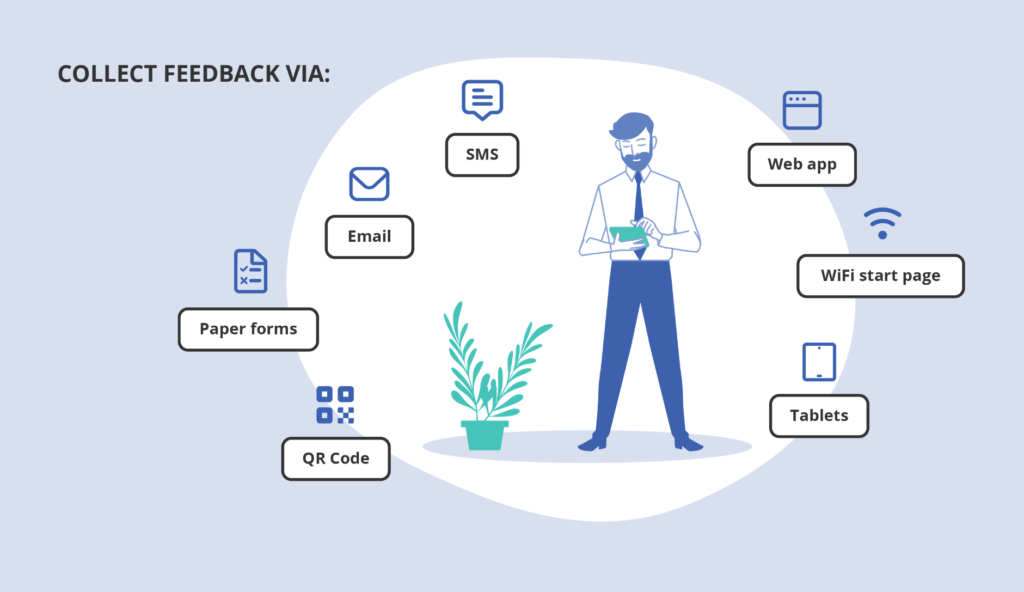Customer feedback is a critical component for any business aiming to thrive in a competitive market. It serves as a direct line of communication between the business and its customers, providing insights into what is working well and what needs improvement. By actively seeking and analysing customer feedback, businesses can make informed decisions that enhance customer satisfaction, drive innovation, and ultimately boost their bottom line. Engaging with customers through feedback fosters a sense of loyalty and trust, ensuring long-term success.
But what exactly constitutes customer feedback, and how can businesses effectively collect it?
What is Customer Feedback?
Customer feedback is the information, opinions, and experiences shared by customers about your products or services. This feedback can take many forms, including reviews, ratings, comments, and surveys. It encompasses both positive and negative responses, offering a comprehensive view of customer satisfaction. Positive feedback highlights what customers love about your products, while negative feedback provides valuable insights into areas needing improvement. Understanding customer feedback is essential for identifying trends, addressing issues promptly, and continuously enhancing the customer experience.
How to Collect Customer Feedback
Gathering customer feedback can be accomplished through various methods. Online surveys and questionnaires are common tools that allow businesses to ask specific questions and gather detailed responses. Email feedback requests can reach customers directly and encourage them to share their experiences. Feedback forms on websites or mobile apps provide convenient ways for customers to offer their opinions. Social media platforms also serve as rich sources of unsolicited feedback through comments, posts, and messages. Additionally, direct interactions with customer service representatives offer real-time insights into customer satisfaction.

Employing a combination of these methods ensures a robust and comprehensive understanding of customer perspectives.
Why is Customer Feedback Important?
Measure Customer Satisfaction: Customer feedback provides a direct measure of how satisfied customers are with your products and services. By understanding their satisfaction levels, businesses can tailor their strategies to improve customer experience and effectively manage the customer lifecycle.
According to CX statistics, 86% of consumers are willing to pay more for a better customer experience.
Identify Product Flaws: Feedback helps in identifying issues and flaws in products or services that may not be apparent internally. This allows for continuous improvement and shows customers that their opinions are valued and acted upon, thereby building a strong relationship through the feedback loop.
Enhance Brand Advocacy: When your existing customers are satisfied, they are more likely to recommend your products or services, promoting brand advocacy. Brand advocacy is an effective way to grow your business organically through word of mouth. By collecting and prioritising user feedback, you can learn how to keep your customers happy. Word of mouth, an excellent customer acquisition channel for any business, results in positive feedback, favourable reviews, and more recommendations of your product to others.
Boost Customer Loyalty: By demonstrating that you value customer opinions and are committed to making improvements based on their feedback, businesses can foster customer loyalty.
90% of customers read online reviews before visiting a website and 88% of customers trust these opinions almost as if they were personal recommendations.- Invesp

Loyal customers are more likely to make repeat purchases and recommend your business to others, driving long-term success.
Reduce Churn: Negative feedback, if left unaddressed, can lead to customer churn. By proactively seeking out and resolving issues highlighted by customer feedback, businesses can reduce churn rates and enhance overall customer satisfaction, leading to a more stable customer base.
Inform Business Decisions: Customer feedback provides actionable insights that inform strategic business decisions. Whether it’s product development, marketing strategies, or customer service improvements, feedback ensures that these decisions are aligned with customer needs and expectations.
Improve Customer Experience and Service: Regularly collecting and acting on customer feedback helps businesses continuously improve the overall customer experience and the quality of their services.
Key insights such as customer satisfaction score (CSAT) and net promoter score (NPS) enable customer support teams to enhance service quality. Utilising the right tools and software can simplify the process of collecting valuable feedback, making it more efficient and effective.

The Benefits of Customer Feedback
Business Improvement: Feedback identifies strengths and weaknesses, allowing for targeted improvements in various business areas. This continuous improvement cycle is essential for maintaining high standards and meeting customer expectations.
Increase Revenue and Profit: By acting on feedback, businesses can attract and retain quality customers, leading to increased sales, revenue, and profitability.
Businesses can grow revenues between 4% and 8% above their market when prioritizing better customer feedback. –Bain & Company
Satisfied customers are more likely to make repeat purchases and recommend the business to others.
Effective Targeting: Customer feedback provides valuable information about customer preferences and behaviours. This data can be used to create more effective marketing strategies that resonate with target audiences, leading to higher conversion rates and better return on investment.
Business Insights: Negative feedback often reveals underlying issues that might not be visible from within the organisation. By addressing these issues, businesses can improve their products, services, and overall customer experience, leading to greater customer satisfaction.
Predict Market Trends: Customer feedback helps identify emerging trends and changing customer needs.
By staying attuned to these trends, businesses can adapt and innovate proactively, staying ahead of competitors and meeting market demands.
Stay Competitive: In a competitive market, regular feedback collection and responsive action ensure that businesses remain relevant and appealing to customers.
After more than one bad experience, around 80% of consumers say they would rather do business with a competitor. – Zendesk
Collecting feedback from both current and potential customers allows you to understand which promotions are most effective and which discounts are most appealing to them.

How Can You Harness the Power of Customer Feedback?
Customer feedback is indispensable for understanding and meeting customer needs, leading to improved business performance, customer satisfaction, and loyalty. Utilising feedback tools can streamline the feedback management process, helping businesses build better products and foster stronger customer relationships.


